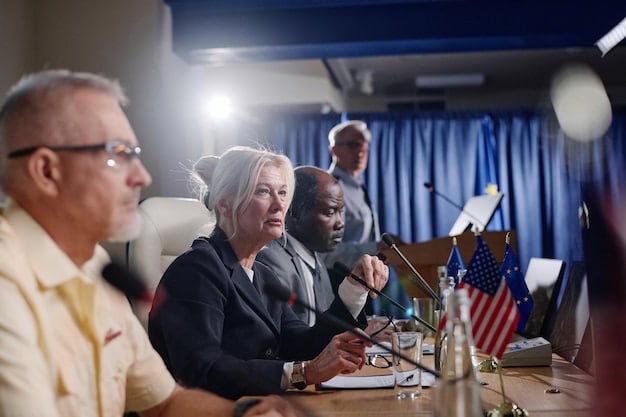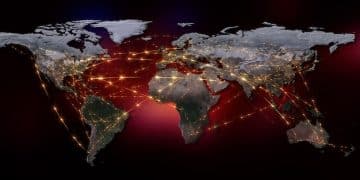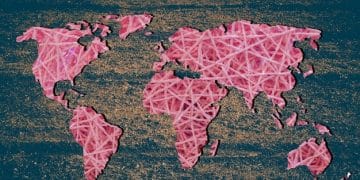How Will the US Election Cycle in 2028 Shape Future Foreign Policy Decisions?

Advertisements
The 2028 US election cycle is poised to significantly realign American foreign policy, with potential shifts in alliances, trade agreements, and global strategic priorities influenced by the evolving domestic political landscape and emerging international challenges.
As the 2028 American election cycle draws closer, a critical question emerges: How Will the US Election Cycle in 2028 Shape Future Foreign Policy Decisions? The outcome is not merely about domestic governance; it holds profound implications for America’s role on the global stage, influencing everything from international alliances to trade relations and approaches to geopolitical challenges.
The Evolving Geopolitical Landscape and its Electoral Impact
The geopolitical landscape is in constant flux, a dynamic reality that profoundly influences America’s electoral cycles and, consequently, its foreign policy decisions. In the lead-up to 2028, several key global shifts demand attention, from the rise of new economic powers to persistent conflicts and the accelerating pace of technological innovation.
Candidates will undoubtedly frame their foreign policy platforms in response to these ongoing transformations. The narratives they craft about America’s place in the world, its responsibilities, and its strategic adversaries will resonate deeply with an electorate increasingly aware of global interconnectedness.
Rising Multipolarity and Strategic Competition
The world is moving inexorably towards multipolarity, with a diffusion of power beyond traditional Western dominance. This shift creates both opportunities and significant challenges for U.S. foreign policy. The 2028 election will likely see candidates debating how best to navigate this complex environment, emphasizing either cooperation or renewed strategic competition.
- China’s Ascendance: The economic and military growth of China remains a central concern, with candidates likely offering differing approaches to managing this rivalry, from engagement to containment.
- Russia’s Continued Influence: Russia’s role in global affairs, particularly its actions in Eastern Europe, will continue to be a significant foreign policy issue, potentially influencing defense spending and alliance commitments.
- Emerging Powers: The growing assertiveness of nations like India, Brazil, and regional blocs will test the next administration’s diplomatic agility.
The implications for global trade, technological leadership, and security architectures will be central to the foreign policy debates. Voters will seek clear answers on how their chosen leader intends to protect American interests while fostering global stability.
Technological Disruption and Cyber Warfare
Technological advancement, especially in artificial intelligence, biotechnology, and quantum computing, presents both unparalleled opportunities and grave threats. The next presidential term will confront the imperative of regulating these technologies on an international scale while simultaneously leveraging them for national security and economic advantage.
Cyber warfare, disinformation campaigns, and the weaponization of social media have become regular features of international relations. The 2028 candidates will need to present robust strategies for defending critical infrastructure, combating foreign interference, and maintaining digital sovereignty.
This discussion will be vital, as the interconnectedness of modern societies means that a cyberattack on one nation can have ripple effects globally, impacting supply chains, financial markets, and public trust.
The evolving geopolitical landscape demands adaptable and forward-thinking foreign policy. The 2028 election will be a crucial juncture for the American electorate to decide which vision for global engagement best prepares the nation for the challenges and opportunities ahead.

Domestic Pressures and Their Influence on Foreign Policy
While global events undoubtedly shape foreign policy, the internal dynamics of American society and politics exert an equally powerful, though often less visible, influence. The 2028 election cycle will be no exception, with domestic pressures playing a significant role in defining foreign policy priorities and approaches.
The interplay between public opinion, economic conditions, and partisan divides creates a complex web that candidates must navigate. Understanding these internal forces is crucial to predicting the trajectory of U.S. foreign policy post-2028.
Economic Imperatives and Trade Policy
The state of the U.S. economy, including inflation, job growth, and supply chain resilience, will inevitably steer foreign policy discussions. Economic anxiety often translates into demands for protectionist measures or, conversely, calls for expanded trade opportunities.
Future administrations will face the intricate balancing act of protecting domestic industries while fostering international trade relationships. Debates around tariffs, trade agreements, and economic alliances will be central to the 2028 campaign. The impact of global economic shifts, such as de-dollarization trends or the rise of new economic blocs, will also feature prominently in how candidates frame their economic foreign policy.
Public Opinion and Isolationist Tendencies
Public sentiment towards international engagement can swing dramatically, often influenced by recent conflicts, economic downturns, or perceived threats. While there has been a historical pendulum swing between interventionism and isolationism, the post-pandemic era has seen a subtle but growing demand for prioritizing domestic issues.
- “America First” Sentiment: Elements of this sentiment continue to resonate with portions of the electorate who prefer a focus on internal challenges over extensive foreign commitments.
- Support for Alliances: Despite isolationist currents, significant public support often remains for traditional alliances and multilateral institutions, albeit with calls for burden-sharing.
- Humanitarian Concerns: Public appeals for humanitarian interventions or aid often emerge in response to global crises, influencing policy decisions and resource allocation.
Candidates will meticulously gauge public opinion to tailor their foreign policy messages, understanding that voter sentiment can dictate the political viability of certain international actions.
Partisan Divides and Bipartisan Consensus
The deepening partisan divide in American politics extends to foreign policy, making sustained bipartisan consensus more challenging. Different political parties often hold fundamentally distinct views on international interventions, the role of international organizations, and preferred diplomatic tools.
The 2028 electoral landscape will likely highlight these divides, with each party attempting to define what constitutes effective and ethical foreign policy. Achieving any form of bipartisan support for major foreign policy initiatives will require deft political maneuvering and a willingness to compromise, a task that has grown increasingly difficult in recent years.
The nexus between domestic concerns and foreign policy is undeniable. The 2028 election will reveal how deeply these internal pressures shape the next administration’s approach to global affairs, reflecting the will of the American people and the prevailing economic and social conditions within the nation.
Alliances and Partnerships: Reconsideration or Reinforcement?
A cornerstone of U.S. foreign policy has always been its intricate network of alliances and partnerships. These relationships, built over decades, provide collective security, facilitate trade, and amplify diplomatic influence. However, the 2028 election cycle will undoubtedly prompt a critical reevaluation of these ties.
The debate will center on whether existing alliances require reinvention to address contemporary threats or if their established structures remain the most effective tools for projecting American power and values globally.
The Future of NATO and Transatlantic Relations
The transatlantic alliance, particularly NATO, has faced renewed scrutiny and internal debates in recent years. While still a cornerstone of European security, questions about burden-sharing, strategic focus, and expansion will likely feature prominently in the 2028 foreign policy discourse.
Candidates may advocate for strengthening NATO’s collective defense, adapting its mission to include new threats like cyber warfare, or, conversely, push for a recalibration of U.S. commitments within the alliance, potentially demanding greater contributions from European members.
The enduring relevance and adaptability of NATO in a multipolar world will be a key discussion point, signaling how the next administration intends to approach European security.
Indo-Pacific Alliances and Counterbalancing Strategies
The Indo-Pacific region has emerged as a primary theater for geopolitical competition, particularly with the rise of China. U.S. alliances with Japan, South Korea, Australia, and the Philippines, alongside informal groupings like the Quad, are vital to maintaining regional stability and a free and open Indo-Pacific.
The 2028 election will likely see candidates proposing different strategies for bolstering these alliances. This could include increased military cooperation, enhanced economic integration, or more robust diplomatic efforts to counterbalance rival influences.
- Enhanced Military Exercises: Joint military drills and technology sharing will likely increase as a deterrent measure.
- Economic Frameworks: New economic partnerships, distinct from traditional trade agreements, may be proposed to counter economic coercion.
- Diplomatic Engagement: Intensified diplomatic efforts with regional partners to forge a common front on shared challenges.
The balance between fortifying existing security pacts and developing new, agile partnerships will be critical to the next administration’s approach to Asia.
Emerging Partnerships and Ad Hoc Coalitions
Beyond traditional alliances, the U.S. has increasingly engaged in ad hoc coalitions and partnerships to address specific challenges, such as climate change, pandemics, or regional crises. The 2028 election may signal a shift towards a more flexible and issue-oriented approach to international cooperation.
This could involve forging alliances with states that do not share all American values but are strategically aligned on specific issues. The implications of such pragmatic partnerships for human rights and democracy promotion will be subjects of intense debate.
Whether the 2028 election leads to a reinforcement of existing alliances or a more significant reconsideration of their utility depends heavily on the specific candidates and the foreign policy doctrines they espouse. The debate will reflect a blend of strategic necessity, domestic priorities, and geopolitical realities.
Human Rights and Democracy Promotion: A Shifting Emphasis?
For decades, human rights and the promotion of democracy have been central tenets of American foreign policy, often intertwined with its diplomatic and economic engagements. However, the 2028 election cycle could herald a significant shift in the emphasis placed on these values, driven by evolving geopolitical realities and domestic political currents.
The debate will likely pivot on the prioritization of values versus strategic interests, and the efficacy of different approaches to encouraging democratic norms abroad.
Balancing Values and Geopolitical Interests
One of the enduring tensions in U.S. foreign policy is the balance between promoting democratic values and securing geopolitical interests. In a world increasingly defined by strategic competition with authoritarian regimes, candidates in 2028 will face tough choices about how aggressively to champion human rights.
Some may argue for a more pragmatic approach, prioritizing stability and strategic alliances over direct interventions aimed at democratization. Others might contend that upholding democratic values is intrinsically linked to long-term American security and global leadership.
This complex balancing act will influence policy decisions on trade, aid, and diplomatic relations with nations whose human rights records are questionable but which are strategically important.
Tools of Democracy Promotion
The mechanisms through which the U.S. attempts to promote democracy—ranging from financial aid to civil society organizations, diplomatic pressure, sanctions, and even military intervention—will also be subject to scrutiny. The effectiveness and unintended consequences of these tools will be vigorously debated.
- Sanctions Policy: The use of targeted sanctions against human rights abusers or corrupt regimes might be refined or expanded.
- Diplomatic Engagement: The role of quiet diplomacy versus public condemnation in addressing human rights abuses will be a key consideration.
- Soft Power: Investments in cultural exchange programs, education, and media initiatives to bolster democratic ideals may gain prominence.
The 2028 election will present an opportunity to reassess which tools are most effective, least disruptive, and align best with America’s overall foreign policy goals. The efficacy of ‘leading by example’ versus active intervention will also be a major theme.
The Impact of Domestic Polarization on Global Values
Domestic political polarization and challenges to democratic institutions within the U.S. itself can complicate its ability to credibly promote democracy abroad. Accusations of hypocrisy can undermine American influence and moral authority.
Candidates in 2028 will need to address how they intend to restore faith in democratic processes at home while simultaneously advocating for them internationally. The connection between domestic strength and global influence will be a critical dimension of the human rights and democracy debate.
The future direction of U.S. foreign policy on human rights and democracy promotion will thus be a nuanced reflection of internal priorities, external realities, and the philosophical underpinnings of the next administration’s approach to global engagement.
Climate Change and Global Health: Integrated into Security Policy?
Traditionally viewed through environmental or humanitarian lenses, climate change and global health have increasingly been recognized as fundamental threats to national and international security. The 2028 U.S. election cycle will likely solidify their integration into mainstream foreign policy and security frameworks.
The next administration will face the imperative of not only addressing these challenges domestically but also leading international efforts to mitigate their global impact, recognizing their profound implications for stability, resources, and human well-being.
Climate Change as a Geopolitical Threat
The impacts of climate change – including extreme weather events, resource scarcity, mass migration, and instability in vulnerable regions – are no longer abstract environmental concerns; they are direct drivers of geopolitical instability. The 2028 presidential hopefuls will need concrete plans for addressing this multifaceted threat.
This could include increased international cooperation on emission reduction, investments in climate resilience aid, and the strategic positioning of the U.S. as a leader in green technology. The potential for climate-induced conflicts over water, food, and habitable land will demand innovative diplomatic and security responses.
The debate will also touch upon the economic implications of climate transitions, particularly how to balance environmental protection with economic growth and energy security, both at home and abroad.
Global Health Security and Pandemic Preparedness
The COVID-19 pandemic starkly demonstrated that global health crises are not merely public health issues but significant national security threats. Future administrations will be under pressure to bolster international pandemic preparedness and response mechanisms.
This involves strengthening global health institutions like the World Health Organization (WHO), fostering international research collaborations, and ensuring equitable access to vaccines and therapeutics. The candidacies in 2028 will likely present different blueprints for establishing a robust global health security architecture.
- Enhanced Surveillance: Investment in global disease surveillance systems to detect and respond to outbreaks quickly.
- Supply Chain Resilience: Efforts to diversify and secure supply chains for essential medical supplies and pharmaceuticals.
- Vaccine Diplomacy: The strategic use of vaccine development and distribution as a foreign policy tool.
The discussions will stress the importance of preventative measures and international cooperation to avoid future global health catastrophes, emphasizing that domestic health security is inextricably linked to global health and stability.
Resource Diplomacy and Green Alliances
As the world transitions towards renewable energy and sustainable resources, the geopolitics of energy and critical minerals will undergo significant shifts. The 2028 election may see a greater emphasis on “green diplomacy,” forging alliances based on shared climate goals and sustainable development.
This could involve new trade agreements focused on environmental goods and services, joint investments in renewable energy infrastructure in developing nations, and diplomatic efforts to secure critical mineral supply chains that are essential for future technologies.
The integration of climate change and global health into U.S. foreign policy is no longer an ancillary consideration but a core component of national security. The 2028 election will reveal how the next American leader intends to navigate these complex, interconnected challenges on the global stage.
Regional Hotspots and Conflict Resolution Strategies
Even as new global challenges emerge, traditional regional hotspots and ongoing conflicts continue to demand significant attention and strategic thinking from U.S. foreign policy. The 2028 election will inevitably bring forth differing approaches to these enduring dilemmas, from the Middle East to Eastern Europe and beyond.
Candidates will be pressed to articulate clear, actionable strategies for managing these volatile situations, balancing humanitarian concerns with strategic interests and the imperative of preventing wider escalation.
The Middle East: Evolving Engagements
The Middle East remains a crucible of complex conflicts, from the Israeli-Palestinian issue to internal instabilities in various states and the activities of non-state actors. The U.S. role in the region has been consistently debated, with calls for both withdrawal and renewed engagement.
The 2028 election will likely feature discussions on the future of U.S. troop presence, the efficacy of diplomatic initiatives, and humanitarian aid. Debates may also focus on the Abraham Accords and their potential for expanding regional peace, alongside the ongoing challenges posed by Iran’s nuclear program and regional proxies.
The next administration will inherit a region that demands a nuanced approach, balancing counter-terrorism efforts, diplomatic outreach, and support for stability without necessarily choosing sides in every conflict.
Eastern Europe and the Aftermath of Conflict
The conflict in Eastern Europe has profoundly reshaped the security landscape, re-emphasizing the importance of NATO and collective defense. The 2028 candidates will likely discuss the long-term implications of this conflict for European security, U.S. defense spending, and alliances.
- Reconstruction and Aid: The need for substantial reconstruction aid and support for affected populations will likely be a humanitarian and strategic priority.
- Security Guarantees: Discussions around extending security guarantees and increasing military assistance to frontline states will be critical.
- Sanctions Regimes: The effectiveness and future of sanctions against aggressor nations will continue to be evaluated.
The approach towards Eastern Europe will underscore the next administration’s stance on international law, sovereignty, and the role of great power competition.
Africa and Latin America: Opportunities and Challenges
While often overshadowed by other regions, Africa and Latin America present both significant opportunities for economic partnership and development, alongside persistent challenges like political instability, humanitarian crises, and the growing influence of rival powers.
Candidates in 2028 may propose renewed engagement with these continents, focusing on sustainable development, counter-terrorism efforts, or strengthening democratic institutions. The competition for influence with China and Russia in these regions will also feature in policy discussions.
The strategies for resolving existing conflicts and preventing new ones will be a litmus test for the next administration’s foreign policy agility and its commitment to global stability. The ability to pivot between immediate crisis response and long-term strategic investments will be paramount.
The Future of American Leadership and Multilateralism
The question of American leadership in the 21st century and its engagement with multilateral institutions will be a defining theme of the 2028 U.S. election cycle. After periods of both robust internationalism and more inwardly focused approaches, the next administration will need to articulate a clear vision for America’s role on the global stage.
The debate will encompass the efficacy of international cooperation, the reform of global governance bodies, and the extent to which the U.S. should lead by example versus through direct intervention.
Reasserting or Redefining American Leadership?
Candidates will likely offer differing philosophies on what American leadership entails. Some may advocate for a return to traditional forms of global leadership, emphasizing moral authority, democratic values, and robust engagement with allies.
Others might argue for a more restrained approach, prioritizing national interests, multilateral burden-sharing, and a focus on specific threats, rather than attempting to be the “world’s policeman.” The concept of “leading from behind” versus “leading from the front” will continue to be a nuanced discussion.
The perception of America’s strength, both economic and military, will play a significant role in shaping these arguments and influencing the electorate’s choice.
Engagement with International Institutions
Multilateral institutions such as the United Nations, the World Trade Organization, and the International Monetary Fund are crucial forums for global cooperation, yet they often face criticism regarding their effectiveness or perceived biases. The 2028 election will likely prompt a reevaluation of U.S. engagement with these bodies.
Proposals might include calls for increased funding and reform of these institutions to make them more agile and representative of the current global order. Conversely, some candidates might advocate for a more reserved approach, engaging only when it directly serves discernible U.S. national interests.
- UN Reform: Debates on Security Council expansion and the UN’s operational efficiency.
- WTO Strengthening: Discussions on reviving the WTO’s dispute settlement mechanism and updating trade rules.
- Climate Forums: Renewed commitment to international climate agreements and financing mechanisms.
The extent of U.S. commitment to these bodies will send a clear signal about its preference for a rules-based international order versus a more transactional approach to foreign policy.
The Impact of Domestic Ideology on Global Outlook
The specific ideologies of the 2028 candidates, whether rooted in progressive internationalism, conservative realism, or populist nationalism, will profoundly shape their global outlook. These ideological lenses will define how they perceive threats, identify opportunities, and prioritize actions on the international stage.
The election will serve as a referendum on the nature of American exceptionalism and the degree to which domestic political identities translate into specific foreign policy doctrines. The outcome will ultimately determine the future character of American leadership and its engagement with a complex, interconnected world.
The path chosen by the next U.S. administration will not only reflect its domestic priorities but also profoundly influence the stability, cooperation, and power dynamics of the entire global system.
| Key Area | Potential Impact on Foreign Policy |
|---|---|
| 🌍 Geopolitical Landscape | Shifts towards multipolarity and technological disruption will redefine strategic priorities. |
| 💼 Domestic Pressures | Economic imperatives and partisan divides will influence trade and engagement levels. |
| 🤝 Alliances & Partnerships | Reconsideration or reinforcement of existing pacts, alongside new ad hoc coalitions. |
| 🌱 Global Challenges | Climate change and global health will be further integrated into security policies. |
Frequently Asked Questions About the 2028 US Election and Foreign Policy
▼
Technological advancements, particularly in AI, cyber warfare, and quantum computing, will deeply influence foreign policy by 2028. Future administrations will focus on regulating these technologies internationally, leveraging them for national security, and defending against cyber threats and disinformation campaigns. Debates on technological leadership and ethical use will be paramount.
▼
Domestic economic conditions, including inflation, job growth, and supply chain resilience, will significantly steer foreign policy. Economic anxiety can lead to demands for protectionism, while prosperity may encourage more open trade policies. Candidates will seek to balance protecting domestic industries with fostering international trade relationships and addressing global economic shifts.
▼
The 2028 election cycle will prompt a reevaluation of US alliances. While some candidates may advocate for strengthening traditional pacts like NATO to address new threats and ensure burden-sharing, others might reconsider commitments, pushing for more flexible, issue-specific coalitions. The emphasis will be on adapting alliances to fit a multipolar world.
▼
Human rights promotion will remain a tenet of US foreign policy, but its emphasis might shift. The next administration could balance promoting democratic values with securing geopolitical interests, potentially favoring pragmatic alliances. The tools for human rights advocacy, such as sanctions or diplomatic pressure, will also be reassessed for effectiveness and credibility.
▼
Climate change is increasingly recognized as a national security threat, making its integration into US foreign policy unavoidable post-2028. The next administration will likely focus on increased international cooperation for emission reduction, climate resilience aid, and green technology leadership. Resource diplomacy and new alliances based on climate goals will also gain prominence.
Conclusion
The 2028 US election cycle stands as a pivotal moment for American foreign policy, poised to redefine the nation’s global posture amidst a rapidly evolving international landscape. The interplay of geopolitical shifts, domestic pressures, and the philosophical tenets of the incoming administration will shape critical decisions on alliances, trade, human rights, and responses to emerging threats like climate change and global health crises. Ultimately, the outcome will dictate whether America opts for a path of renewed global leadership and multilateral engagement or a more inwardly focused, pragmatic approach, profoundly impacting the trajectory of international relations for years to come.






